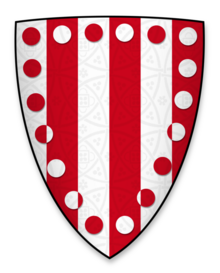Roger de Montbegon
Roger de Montbegon (* around 1165, † 1226 ) was an English nobleman and rebel. He was a member of the aristocratic opposition that forced King John Ohneland to recognize the Magna Carta in 1215 .
Roger Montbegon was a son of Adam de Montbegon and Maud, a daughter of Adam FitzSwain. His family owned the estate of Hornby with Castle Stede in Lancashire and other estates in Nottinghamshire , Lincolnshire and the West Riding of Yorkshire , which Roger inherited after his father's death in 1172.
In the 1190s, Montbegon was one of Prince Johann's supporters when he, as Count von Mortain, tried to fight for power in England while his brother King Richard the Lionheart was imprisoned in Germany. When this attempt failed, Montbegon's properties were briefly confiscated. After Prince Johann became King of England in 1199 after the death of Richard the Lionheart, Montbegon offered him 500 marks in order to get permission to marry Olivia, the widow of Robert FitzJohn. However, he was soon disappointed in the reign of John, from whom he had hoped for more evidence of favor. When unrest against the king broke out in northern England after the conquest of Normandy by France in 1205, the king suspected Montbegon of being a rebel.
Around 1214, Montbegon, along with Eustace de Vesci and William de Mowbray, belonged to the hard core of John's opponents in northern England. As one of the first barons, in 1214 he refused to pay the shield money required for the campaign in Poitou . After the aristocratic opposition had forced the king to recognize the Magna Carta in June 1215, Montbegon was elected one of the 25 barons who were supposed to monitor the king's compliance with the regulations. However, when the barons waged open war against the king again in the autumn , he was a firm part of the rebel camp. Together with Richard de Percy , he submitted to the new King Henry III in August 1217 .
Like many barons, Montbegon rejected the king's authority over the next few years when he was concerned. During the rebellion against King John, Montbegon's estates Clayworth , Oswaldbeck and North Wheatley in Nottinghamshire had been occupied by royal troops. In contrast to other barons, Montbegon initially tried not to enforce his claims to the goods by force, but in court. His opponent, Sheriff Philip Mark von Nottingham, had previously been one of King John's closest confidants and tried persistently to prevent the goods from being surrendered until 1220. In 1220 Montbegon was accused of having occupied the estates by force, and he was ready to have his claims fought out by a champion as a divine judgment in a duel. When the court refused, he left the court furious and, despite three requests from the Constable of Nottingham, refused to appear to deliver the judgment. It was only through the intervention of the legal advisor Hubert de Burgh that Montbegon received North Wheatley and Clayworth back in 1220. When the rebellion of William de Forz was put down in 1221, Montbegon was one of the barons who besieged Forz castles in northern England.
Montbegon died childless, his great-nephew Henry de Monewdon became his heir .
Web links
- Nigel Saul: Magna Carta 800th: Roger de Montbegon
Individual evidence
- ↑ Gatehouse Gazetteer: Hornby Castlestede. Retrieved November 25, 2015 .
- ^ Matthew Strickland: Enforcers of Magna Carta (act. 1215–1216) (Oxford Dictionary of National Biography; license required). Retrieved December 27, 2015 .
- ^ David Carpenter: The minority of Henry III. University of California Press, Berkeley 1990. ISBN 0-520-07239-1 , p. 170
- ^ David Carpenter: The minority of Henry III. University of California Press, Berkeley 1990. ISBN 0-520-07239-1 , p. 234
- ^ British History Online: Townships: Hornby. Retrieved November 25, 2015 .
| personal data | |
|---|---|
| SURNAME | Roger de Montbegon |
| ALTERNATIVE NAMES | Montbegon, Roger de |
| BRIEF DESCRIPTION | English nobleman and rebel |
| DATE OF BIRTH | around 1165 |
| DATE OF DEATH | 1226 |
